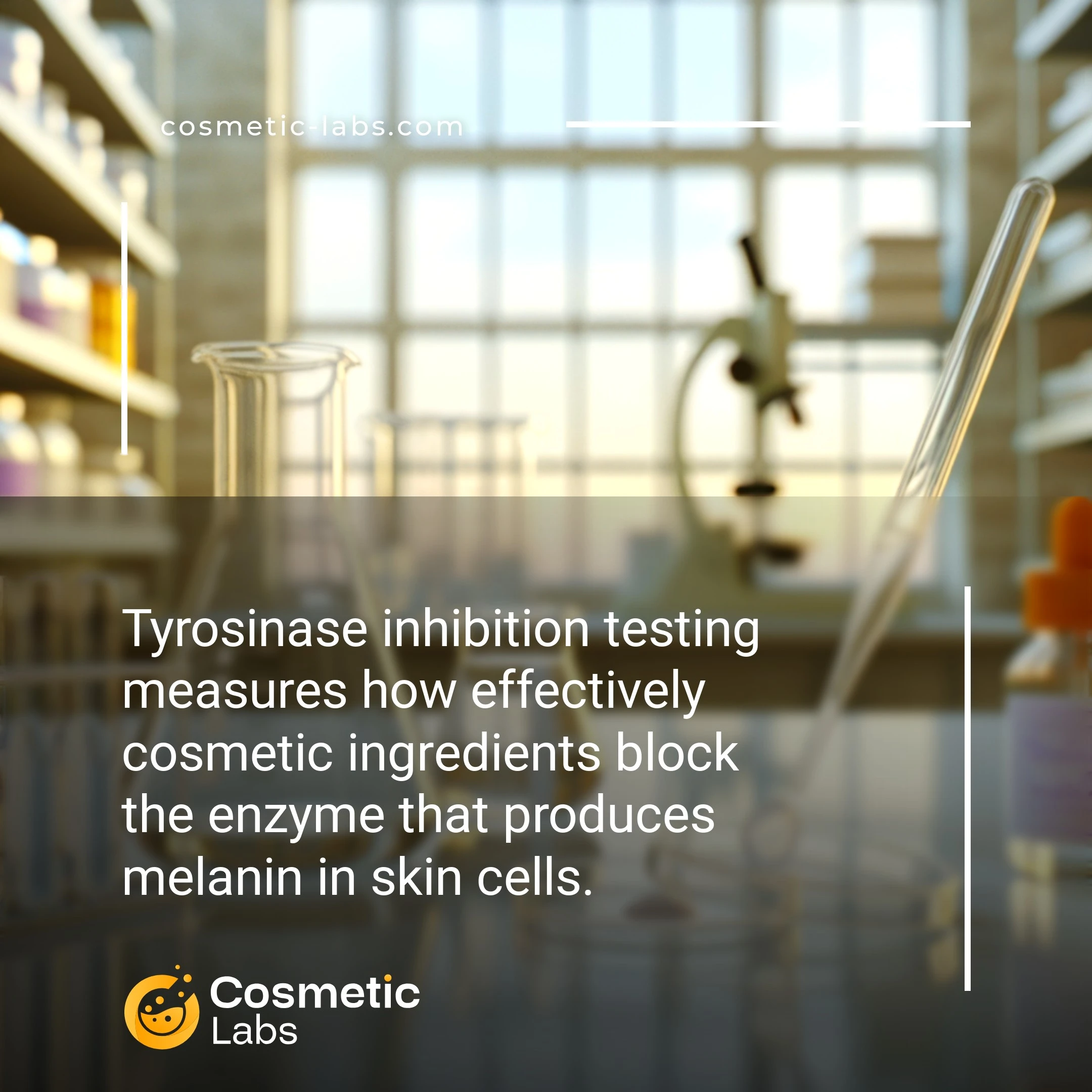Tyrosinase Inhibition Testing Services for Cosmetic Brands

What is Tyrosinase inhibition?
Tyrosinase inhibition testing for pigmentation measures how effectively cosmetic ingredients block the enzyme tyrosinase, which controls melanin production in skin cells. Labs use standardized assays with mushroom tyrosinase or cultured melanocytes to test ingredient concentrations, typically measuring IC50 values between 10-500 μg/mL for whitening actives. This testing reveals that many natural extracts like kojic acid show 60-80% inhibition rates, helping brands validate brightening claims before market launch.
Why do you need this service?
Cosmetic labs use tyrosinase inhibition assays to validate whitening claims for skin brightening serums, dark spot correctors, and anti-aging formulations before market launch. These enzyme-based tests measure how effectively your active ingredients block melanin production, delivering quantifiable data for regulatory submissions and marketing claims within 2-4 weeks of testing initiation.
Who provides Tyrosinase inhibition services?
All cosmetic labs providing Tyrosinase inhibition services
There is no company providing these services at the moment.
Tyrosinase Inhibition Testing for Pigmentation Control
Tyrosinase inhibition testing measures how effectively your cosmetic ingredients block the enzyme responsible for melanin production. This biochemical assay forms the backbone of pigmentation control research, helping brands develop products that address hyperpigmentation, age spots, and uneven skin tone.
Enzyme Activity Measurement Methods
Labs use spectrophotometric analysis to measure tyrosinase activity before and after ingredient exposure. The standard protocol involves mushroom tyrosinase with L-DOPA substrate, tracking dopachrome formation at 475nm wavelength.
Testing parameters include:
- IC50 values (concentration for 50% inhibition)
- Dose-response curves across multiple concentrations
- Kinetic analysis for inhibition mechanisms
- Comparative studies against reference compounds like kojic acid
Results help you understand your ingredient’s potency and optimize formulation concentrations for whitening serums and brightening treatments.
Cell-Based Melanogenesis Assays
Beyond enzyme testing, labs run melanocyte cell cultures to evaluate real-world pigmentation effects. B16 melanoma cells or human melanocytes provide insight into how ingredients perform in biological systems.
Key measurements include:
- Melanin content reduction percentages
- Cell viability to confirm safety
- Tyrosinase protein expression levels
- Time-course studies over 72-96 hours
These assays validate enzyme inhibition data and support skin lightening claims for regulatory submissions. Contact labs on our platform to discuss testing protocols that match your product development timeline and budget requirements.
Practical Applications of Tyrosinase Inhibition Testing Services
Cosmetic labs use tyrosinase inhibition testing for pigmentation control to validate ingredient efficacy and support product claims across multiple beauty categories.
Skin Brightening Product Development
Labs test individual ingredients and complete formulations to measure tyrosinase enzyme activity reduction. This testing validates claims for serums, creams, and spot treatments targeting hyperpigmentation and melasma. Quantitative results from IC50 measurements provide the data brands need for regulatory submissions and marketing claims.
Testing protocols typically run 24-72 hours with mushroom tyrosinase assays. Labs measure percentage inhibition at multiple concentrations to establish dose-response curves and determine optimal ingredient levels for finished products.
Anti-Aging Formulation Optimization
Product developers use tyrosinase inhibition data to optimize anti-aging formulations that address age spots and uneven skin tone. Labs test botanical extracts, peptides, and synthetic compounds to identify the most effective depigmenting agents for specific product lines.
Results guide formulation adjustments and ingredient selection during the development phase. Comparative testing between formulation versions helps brands refine their products before moving to clinical trials or market launch.
| Test Parameter | Measurement Method | Typical Results | Application |
|---|---|---|---|
| IC50 Value | Spectrophotometric assay | 0.1-50 μg/mL | Potency comparison |
| Inhibition Percentage | Enzyme activity reduction | 20-90% at test concentration | Efficacy validation |
| Dose Response | Multiple concentration testing | Linear or sigmoid curve | Formulation optimization |
| Stability Testing | Time-course analysis | Activity retention over 6-12 months | Shelf-life determination |
Connect with specialized cosmetic labs on our platform to access tyrosinase inhibition testing services and advance your pigmentation-control product development.
